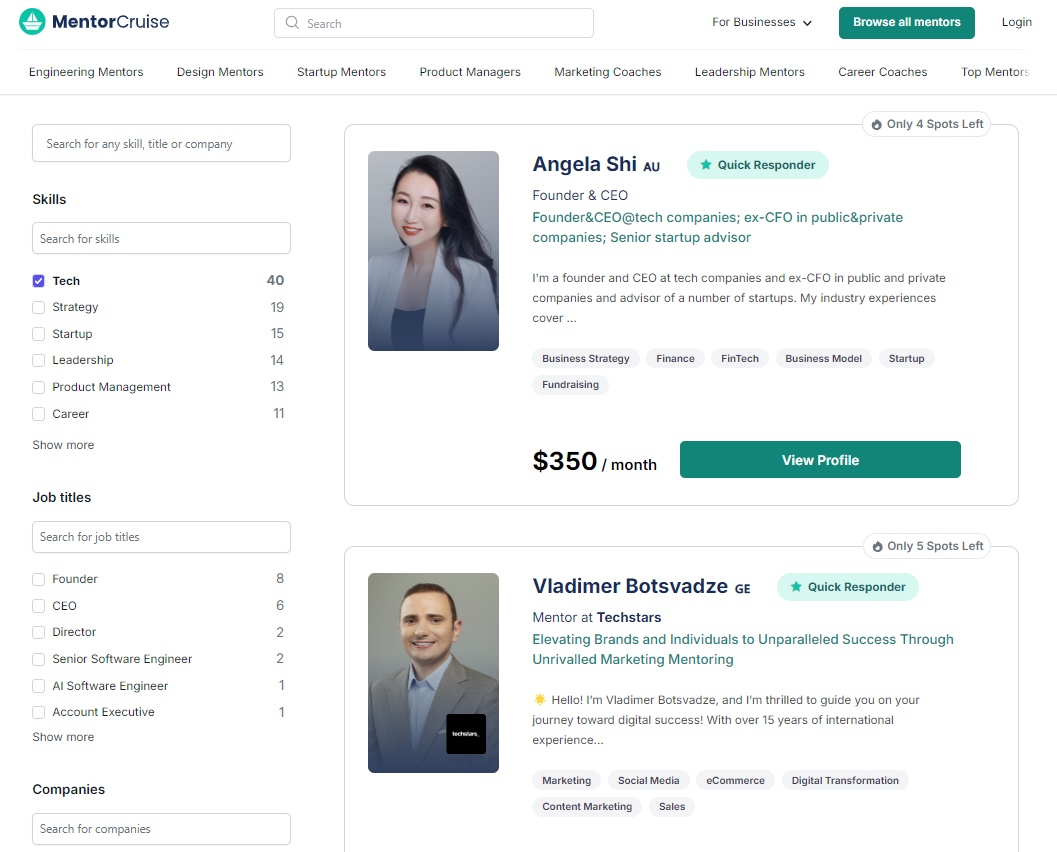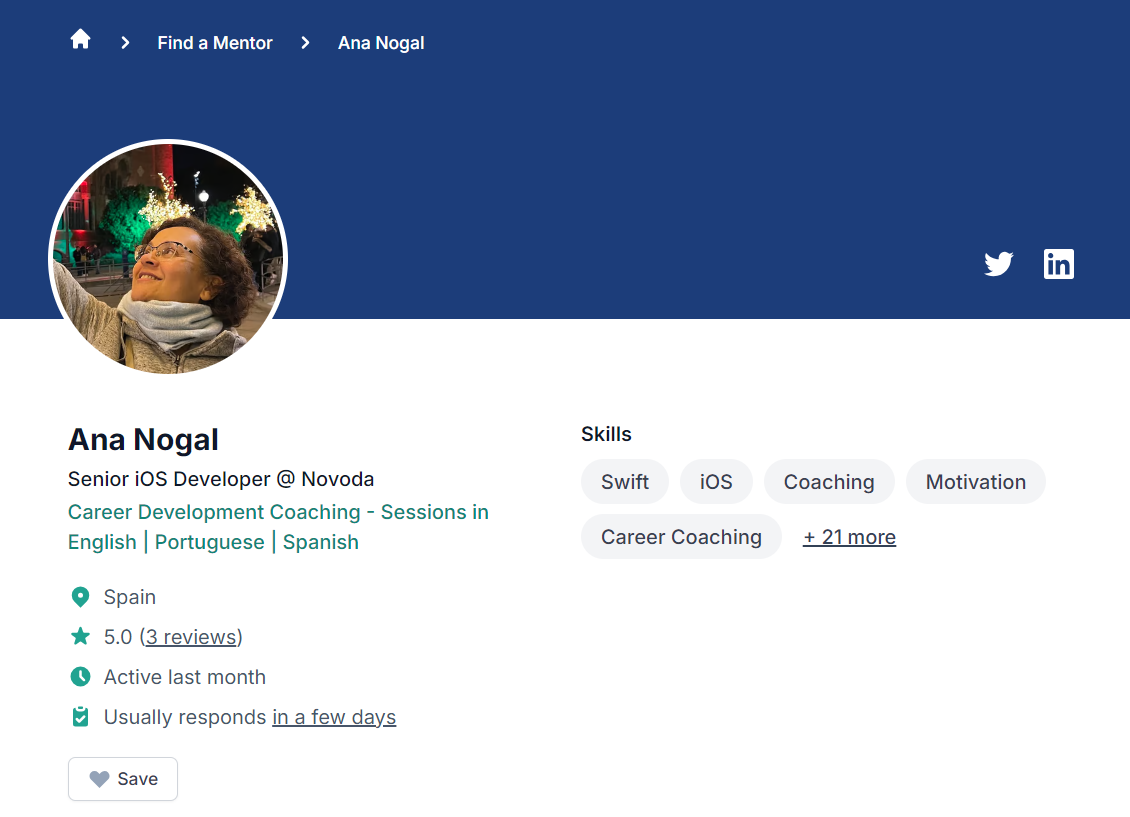Becoming a tech mentor is not only a way to give back to the community, but also an opportunity to deepen your own understanding and expertise.
This MentorCruise guide provides a comprehensive roadmap for becoming a successful tech mentor, from gaining relevant experience to establishing a mentorship practice and continuously improving your skills.
What is a tech mentor?
A tech mentor is someone experienced who provides guidance, support, and knowledge to others in the technology field. This involves sharing insights, offering advice, and helping mentees develop both technical and soft skills.
Unlike traditional teaching, mentorship is often a more personal and tailored experience, focusing on the specific needs and goals of the mentee.
Different types of tech mentors
Software development mentors
These mentors specialize in programming languages, software development methodologies, and best practices in coding. They help mentees improve their coding skills, understand design patterns, and steer through complex technical challenges.
Data science mentors
With expertise in data analysis, machine learning, and statistical modeling, data science mentors guide mentees through data-driven projects. They provide insights into data preprocessing, model selection, and interpreting results.
Cybersecurity mentors
Cybersecurity mentors focus on helping mentees understand security principles, threat mitigation, and compliance standards. They help build secure systems and understand the latest in cybersecurity threats and defenses.
UX/UI design mentors
These mentors specialize in user experience and user interface design. They help mentees develop skills in creating intuitive and engaging interfaces, understanding user behavior, and using design tools effectively.
Cloud computing mentors
Cloud computing mentors guide you through cloud technologies, including infrastructure as a service (IaaS), platform as a service (PaaS), and software as a service (SaaS). They help mentees understand cloud architecture, deployment strategies, and cost management.
At MentorCruise, our tech mentors are here to help you tackle the challenges of growing your business. With their extensive knowledge on tech and industry changes, they can guide you on how to use these tools to your advantage.

Whether you need help with tech strategies or solving technical problems, our tech mentors are ready to support you and help your business stand out.
Examples of our successful tech mentorship
Case study
Former professional basketball player Ryan Wilson transitioned to cybersecurity with the help of our mentor Jordi Scharloo.
After retiring, Ryan sought to become an ethical hacker and received personalized guidance and support. Within three months, he achieved his goal and secured a role as a penetration tester at a cybersecurity firm.
This rapid success highlights how effective targeted mentorship is in navigating career changes and achieving professional goals.
Statistics
- 96% of mentees on MentorCruise report satisfaction with their mentorship experience.
- 80% of mentees achieve significant career progress within the first three months of mentorship.
Why tech mentorship is important
Tech mentorship offers numerous benefits, both for mentors and mentees. Here are a few reasons why it's crucial:
Skill development
Mentorship helps mentees develop technical and soft skills. For example, a software development mentor can help a mentee improve their coding skills and learn best practices for software design.
Career advancement
Mentors provide valuable tech career advice, helping mentees set goals, prepare for job interviews, and navigate career transitions. This is particularly useful for newcomers to the industry.
Networking opportunities
Mentors can introduce mentees to their professional network, opening doors to new opportunities and collaborations. Networking is a vital aspect of career growth in the tech industry.
Mutual growth
Mentorship is a two-way street. Mentors often gain new perspectives, stay updated with industry trends, and enhance their leadership and communication skills through the process.
Benefits of becoming a tech mentor
Professional growth and career advancement
- Guidance and insight: As a tech mentor, you have the opportunity to share valuable industry insights, including career paths, work-life balance, and progression. This not only helps mentees but also solidifies your own understanding and mastery of technical skills and tools.
- Skill development: Mentoring lets you enhance specific skills, adapt to new technologies, and refine your expertise. This continuous learning process can significantly boost your professional portfolio and enhance job prospects. Feedback from mentees can also provide fresh perspectives and improve skill.
- Networking opportunities: Mentoring expands your professional network. By interacting with other mentors and professionals, you open doors to new job opportunities and potential collaborations.
Personal development
- Confidence building: Overcoming challenges and successfully guiding mentees can increase your confidence. This can also enhance your problem-solving skills, preparing you to tackle industry challenges.
- Leadership skills: As a mentor, you develop key leadership qualities, such as active listening and providing constructive feedback. These skills can promote effective communication and team collaboration.
- Personal satisfaction: Mentoring gives you a sense of purpose and personal growth. The ability to positively impact someone's career journey and witness their progress brings unmatched satisfaction.
Continuous learning
- Staying updated: Engaging with mentees keeps you informed about the latest tech trends and developments. This continuous learning helps you stay relevant in a rapidly evolving industry.
- Knowledge sharing: Mentoring is a two-way street— while you give knowledge, you also gain new insights. Access to a range of troubleshooting and problem-solving techniques enriches your own understanding and skills.
How to become a tech mentor

- Gain relevant experience
Experience is the foundation of effective mentorship. To mentor others, you must first build a strong background in the tech industry.
Steps to gain experience:
- Work on diverse projects: Engage in various projects across different domains, such as software development, data analysis, or cybersecurity.
- Master technologies: Gain proficiency in multiple programming languages, frameworks, and tools relevant to your area of expertise.
- Stay updated: Keep up with the latest trends, tools, and technologies in the tech industry to provide current and relevant advice.
- Identify your niche
Specializing in a specific area of tech can make your mentorship more impactful. Focus on areas where you have the most knowledge and passion.
Areas of specialization:
- Software development: Mastery of coding languages and development practices.
- Data science: Skills in analytics, machine learning, and big data.
- Cybersecurity: Expertise in securing systems and understanding threats.
- UX/UI design: Proficiency in designing user-friendly interfaces.
- Cloud computing: Knowledge of cloud platforms and services.
- Develop mentoring skills
Beyond technical expertise, you need to have strong interpersonal skills for an effective mentorship.
Key mentoring skills:
- Clear communication: Convey complex ideas in a simple, understandable manner. Avoid jargon that can confuse your mentee.
- Constructive feedback: Provide honest, supportive feedback that fosters your mentee’s growth. Be specific in your critiques and offer actionable advice.
- Consistent contact: Maintain regular check-ins to support ongoing progress. This can include weekly calls, monthly meetings, or consistent communication.
- Establish your mentorship practice
Set up a structured mentorship practice to help your mentees and achieve your mentoring goals.
Define your goals:
- Clarify your intentions: Understand why you want to mentor and what you hope to achieve. This could include giving back to the community, improving your leadership skills, or staying engaged with the industry.
Find mentees:
- Networking: Make use of your professional network to find potential mentees. Attend industry events, participate in tech meetups, and engage with online communities.
- Mentorship platforms: Join platforms like MentorCruise or Solvery.io, which can connect you with mentees and provide a structured environment for your mentorship.
- Continuous improvement
To be effective as a mentor, continually refine your skills and approach.
Seek feedback:
- From mentees: Regularly ask for feedback to improve your mentoring style. This helps you understand what works and what needs to be improved.
- From peers: Engage with other mentors to exchange ideas and best practices.

Stay updated:
- Ongoing learning: Keep learning about new technologies and methodologies. This makes sure that you can provide up-to-date advice and insights.
- Industry involvement: Stay active in professional organizations and online forums to keep your knowledge current.
Celebrate successes:
- Acknowledge achievements: Celebrate the milestones and successes of your mentees. When you recognize their progress, you motivate them and reinforce the value of your mentorship.
How to find a tech mentorship program
Identify potential mentors
- Explore your network: Check within your existing connections, such as past colleagues, professors, or acquaintances who might offer guidance.
- Use online platforms: Use platforms like LinkedIn to search for professionals in your field. Look for individuals or groups that focus on mentorship and reach out for informal discussions.
- Consider peer mentorship: Don't overlook peers who may be at a similar career stage but can provide different perspectives and support.
Search for formal mentorship programs
- Community programs: Check local libraries, community centers, and schools, which often have mentorship programs. These are great for younger individuals seeking guidance.
- Professional organizations: Join organizations related to your field. Many offer structured mentorship programs connecting you with experienced professionals.
- Online mentorship platforms: Use platforms like Mentorcruise, where we specialize in matching mentees with mentors based on criteria and interests.
Initiate contact
- Reach out: Once you identify a potential mentor, contact them via a brief email or message. Introduce yourself, mention what you admire about their work, and express interest in discussing your career goals.
- Request a meeting: Plan out a low-commitment meeting, like a coffee chat or video call, to get to know each other and discuss your aspirations.
Be open and grateful
- Prepare questions: If they agree to meet, come prepared with questions about their career path and insights.
- Follow up: After the meeting, send a thank-you note to show appreciation for their time and advice.
Common challenges tech mentors face and how to overcome them
Finding the right mentee
Challenge: It's challenging to find mentees who are a good fit.Solution: Clearly define the type of mentee you're looking for, including their skill level, goals, and learning style. Use platforms like MentorCruise to match with suitable mentees.
Setting boundaries
Challenge: Maintaining professional boundaries can be difficult.Solution: Establish clear guidelines for communication and expectations from the get go. This includes discussing availability and response times.
Balancing time commitments
Challenge: Managing your time between work, mentorship, and personal life.Solution: Schedule regular but manageable mentorship sessions. Prioritize your commitments and use tools like Google Calendar and Google Tasks to stay organized.
Adapting to different learning styles
Challenge: Mentees have varying learning preferences.Solution: Adapt your mentoring approach to suit individual mentee needs. Use a mix of verbal explanations, written materials, and hands-on practice to cater to different learning styles.
Maintaining engagement
Challenge: Keeping both yourself and your mentee engaged over time.Solution: Set clear goals and milestones, and regularly review progress. Keep sessions interactive and encourage your mentees to actively participate and take ownership of their learning.
Become a tech mentor with MentorCruise
Becoming a tech mentor is a rewarding journey that benefits not only your mentees, but you too. Whether you're helping a novice coder learn the ropes or guiding a seasoned professional through a career transition, your role as a tech mentor can make a significant difference in someone's career journey.
Ready to embark on your journey as a tech mentor? At MentorCruise, we offer the perfect starting point to connect with eager mentees and share your expertise.







